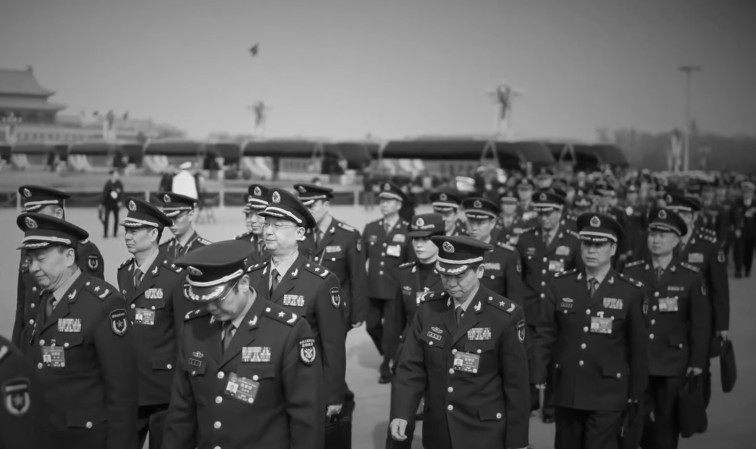On August 22, 2024, four suns suddenly appeared in Changping District, Beijing. (Screenshot from an online video)
[People News] Xi Jinping, the leader of the Communist Party, has been absent for more than 15 days, and rumours are spreading that he has lost his power. The senior CCP elders have already chosen the next successor. Former Vice Premier Wang Yang has been selected to take over as General Secretary. Some independent media sources have revealed that Wang Yang set three conditions for accepting the role, stating that if these conditions are not met, he would refuse to take on the mess left by Xi Jinping.
According to overseas self-media reports, under pressure from the elders, Xi Jinping handed over his power. Zhang Youxia and Hu Wen designated two successors: Wang Yang would take over as General Secretary, and Hu Chunhua would become Premier. Economic scholar Su Xiaohé revealed in a self-media program that although Wang Yang agreed to succeed, he put forward three major conditions.
The first condition is that he must have military power; while serving as General Secretary, he must also be appointed as Chairman of the Central Military Commission. Su Xiaohé believes that without military control, Wang Yang could end up like Zhao Ziyang or Hu Yaobang, potentially being ousted at any time.
The second condition is to replace the entire foreign affairs system. Wang Yi, who advocates the "Wolf Warrior" diplomacy, and Hua Chunying, both of whom have taken a hardline approach, would be removed and replaced with pro-U.S. figures.
The third condition is that there must be a grand reconciliation within the upper echelons of the Communist Party. Internal strife and infighting must end. Su Xiaohé remarked that this stance made him see Wang Yang in a new light. Any country or political party moving toward modern civilization must achieve reconciliation and not be trapped in a life-or-death struggle.
This news has sparked much discussion among netizens.
"Whoever takes over this mess will be unlucky, because they will ultimately be blamed."
"No matter how you walk down the wrong path, it’s still the wrong path. It doesn't matter who takes over."
"Open up the party ban and media censorship, and carry out political system reform."
"Reconciliation is a joke, it’s just a way to smooth things over."
"Is reconciliation within the Party even possible? Every high-level family has big personal interests and is tearing apart and dividing the rich resources of mainland China. With benefits at stake, who would compromise? The Communist Party's philosophy is one of struggle, it's their family heirloom. Can they stop fighting?"
"How can there be reconciliation over June 4th? How can there be reconciliation over Falun Gong? How can we reconcile the deaths of 80 million Chinese people?"
Observers believe that Wang Yang’s three conditions do not include political system reforms, suggesting that the future of China may not be optimistic. Without changing the dictatorial system and without the Communist Party dissolving, there is no hope for China. Even if the CCP is willing to review itself, it will likely be an empty promise.
The book "Nine Commentaries on the Communist Party" states: "The lesson of history is that any promise made by the Communist Party cannot be trusted, and any guarantee will not be fulfilled. Anyone who believes the Communist Party on any issue will lose their life over it."
Wang Yang and Xi Jinping Are Not on the Same Page
Wang Yang, from a commoner background, is known in the CCP for being shrewd, capable, outgoing, and open-minded. He also gives the impression that he is "not on the same page as Xi Jinping."
In October 2007, at the 17th Party Congress, the 52-year-old Wang Yang, along with Li Keqiang, became one of the youngest members of the Politburo. Later that year, Wang Yang was transferred from Chongqing to Guangdong to become the provincial party secretary.
During his five years as Guangdong Party Secretary (2007-2012), Wang Yang established his image as a reformer. He implemented the "腾笼换鸟" (Tenglong Huanniao) policy in Guangdong, shifting the province towards high-tech industries, which was considered a key move for the province's industrial transformation.
One of the most symbolic events during Wang Yang's tenure in Guangdong was his handling of the 2012 "Wukan Incident," a major protest sparked by village officials infringing on the rights of local residents. Under Wang's direction, the issue was resolved peacefully by holding a new village election. He later stated that the election was conducted according to the law and was a correction of the previous superficial elections.
Additionally, during his time in Guangdong, Wang Yang took a stance contrary to that of Bo Xilai, who was then in charge of Chongqing. Wang Yang advocated for the "cake-making" approach, which emphasized development first, followed by distribution, while Bo Xilai advocated for the "cake-cutting" approach, prioritizing distribution over development.
As a result, Wang Yang earned a reputation as a "liberal" within the Party and gained international recognition, which reportedly caused some dissatisfaction among conservative figures within the CCP. During the 18th Party Congress, Wang Yang unexpectedly did not make it into the Standing Committee, but he was appointed as Vice Premier in charge of agriculture, poverty alleviation, and commerce.
At the 20th Party Congress, there was widespread speculation that Wang Yang was the most likely candidate to succeed Li Keqiang. Other potential candidates included Hu Chunhua and Han Zheng. However, both Wang Yang and Hu Chunhua were excluded from the top leadership, and Li Qiang, a close ally of Xi Jinping, was ultimately appointed Premier.











News magazine bootstrap themes!
I like this themes, fast loading and look profesional
Thank you Carlos!
You're welcome!
Please support me with give positive rating!
Yes Sure!